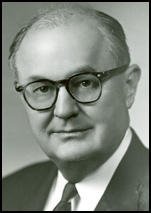John Wright Patman

John Wright Patman was born in Cass County, Texas, on 6th August, 1893. He graduated from law department of Cumberland University, Tennessee in 1916. He was admitted to the bar and worked as a lawyer in Hughes Springs, Texas.
During the First World War Patman served in the United States Army. He enlisted as a private but later became a machine-gun officer.
A member of the Democratic Party, Patman was elected to the House of Representatives in Texas in 1921. He left three years later when he was appointed district attorney to the fifth judicial district of Texas (1924-29).
Patman was elected to Congress in March 1929. He was a strong critic of the economic policies of President Herbert Hoover and in 1932 introduced the Veteran's Bonus Bill which mandated the immediate cash payment of the endowment promised to the men who fought in the war.
In May 1932, 10,000 of these ex-soldiers marched on Washington in an attempt to persuade Congress to pass the Patman Bill. When they arrived in the capital the Bonus Marchers camped at Anacostia Flats, an area that had formerly been used as an army recruiting centre. They built temporary homes on the site and threatened to stay there until they received payment of money granted to them by Congress.
When Congress defeated the Bonus Bill in June the veterans were ordered to leave Washington. When they refused to do so they were driven forcibly from their camps on 28th July, by troops under the command of General Douglas MacArthur. MacArthur, controversially used tanks, four troops of cavalry with drawn sabers, and infantry with fixed bayonets, on the ex-serviceman. He justified his attack on former members of the United States Army by claiming that the country was on the verge of a communist revolution.
Patman was a great supporter of President Franklin D. Roosevelt and his New Deal. He was also instrumental in the passing of the Federal Anti-Price Discrimination Act and the Federal Credit Union Act of 1934. Patman tried again the get the Veteran's Bonus Bill passed by Congress after Roosevelt came to power. This time he gained the support of important political figures such as Huey P. Long and Father Charles Coughlin. In 1936 the Veteran's Bonus Bill was eventually passed over the veto of President Roosevelt. The enactment of this law culminated 17 years of agitation by the veterans for the payment of this bonus.
After the Second World War Patman played an important role in the passing of the Full Employment Act (1946), the British Loan Act (1946), the Housing Act (1946) and the Defense Production Act (1950). He was also chairman of the Select Committee on Small Businesses (1955-63) and the Committee on Banking and Currency (1963-75).
John Wright Patman died in Maryland on 7th March, 1976.
